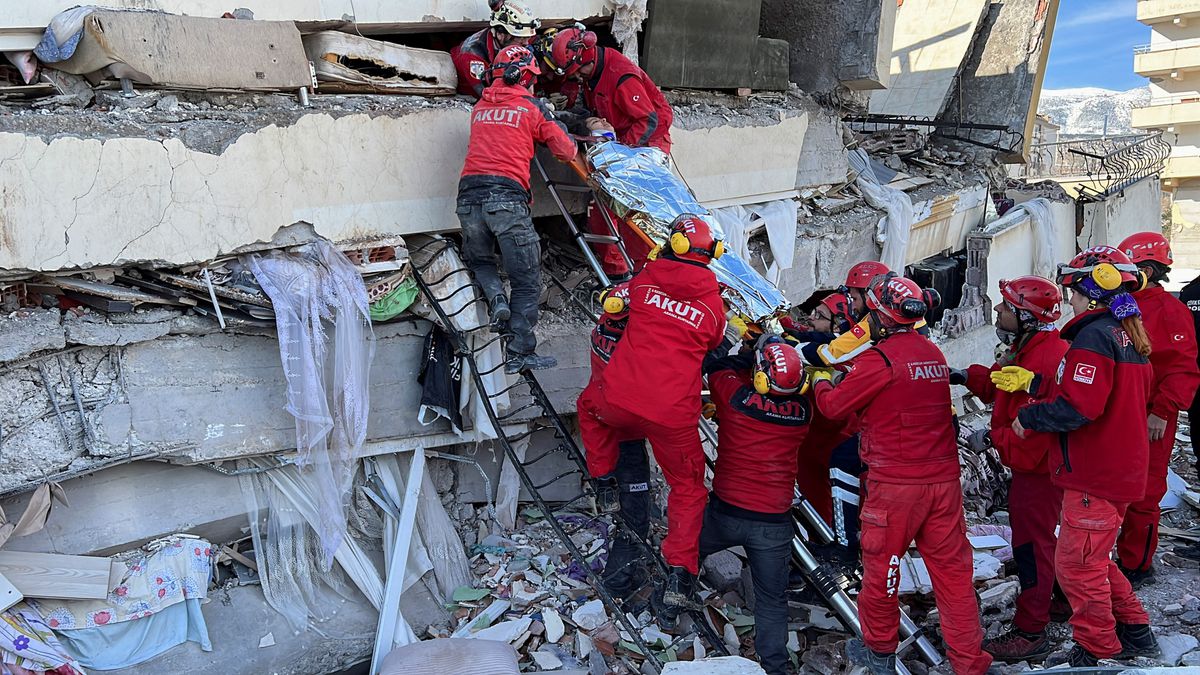Massive Earthquake in Turkey and Syria; What happens next?
Rescuers carry a woman after she was evacuated from under a collapsed building following an earthquake in Kahramanmaras, Turkey, February 7, 2023. Photo Credit: REUTERS/Suhaib Salem
| By Alexander Haidar |
On February 6, 2023, magnitude 7.8 earthquakes struck in the southern-Turkish city of Gaziantep, causing over 100 aftershocks of magnitude 4 or higher between Türkiye and Syria. Initial estimates suggest upwards of 10,000 people have been killed, with numbers expected to rise as many more are still trapped under debris of collapsed buildings. Several shocking videos released on social media sites show Turkish and Syrian citizens surveying the preliminary damage as aftershocks cause entire buildings to collapse in on themselves. Turkish President Recep Tayyip Erdogan declared a 3 month state-of-emergency in the 10 affected regions and mobilized 25,000 search and rescue personnel.
Multiple international organizations have authorized sending rescue teams, established humanitarian supply routes, and pledged financial assistance, including NATO, the U.N., the European Union, Algeria, Austria, China, Croatia, Czech Republic, Germany, Greece, India, Iran, Italy, Israel, Japan Jordan, Lebanon, Malaysia, Mexico, Moldova, Montenegro, New Zealand, Pakistan, Poland, Romania, Russia, Serbia, South Korea, Switzerland, Spain, Taiwan, UAE, UK, and the United States. Several tech companies such as Google, Amazon and Apple also pledged aid to the country, such as SOS Alert, and other communication services. Elon Musk offered to activate the Starlink satellite internet network, however Turkish officials politely declined, citing an already sufficient satellite capacity. Türkiye now faces a time crunch of coordinating the many international rescue crews to successfully document and save those still missing or stuck under rubble.
Meanwhile for Syria, the path for international assistance is not only hindered by long-standing international sanctions; presently, the roads leading up to the only U.N. approved crossing between Turkey and Syria: Bab al-Hawa, have been damaged or blocked on both sides. Despite calls from the Syrian representative during a session of the United Nations on Monday to lift sanctions, the spokesman for The U.S. State Department announced that the United States will continue to fund non-governmental organizations to provide humanitarian assistance to Syrians. Despite this, leaders of Algeria, Egypt, Iran, Iraq, Lebanon, Oman, Russia, Tunisia, and the UAE have pledged to send emergency response workers and humanitarian assistance. These groups will need to decide whether to work within existing resource allocation and humanitarian programs or attempt to rebuild ties with the Syrian government. Syrian President Bashar al-Assad will look to pursue a state-formulated rescue effort to prove his government’s authority, however, the reality of sanctions against those who cooperate with them could ultimately weaken the rescue efforts and cause delays. The immediate future will likely see a renewed effort by the Syrian Government to build its legitimacy amongst regional leaders, however it will be much more difficult for that to be achieved with European and other Western leaders.
Early estimates also indicate that over 3000 buildings have completely collapsed, indicating the clear danger outdated infrastructure poses in an active seismic zone. Following the 1999 earthquake in Northwestern Türkiye which killed over 17,000 people, the country supposedly revived its seismic building codes. Immense efforts were undertaken to repair damaged buildings as well as to retrofit old buildings, however initial surveying has shown that the mix of new and old buildings built to different standards has been a major cause of damage. International engineers have begun analyzing damage and noted that even newly constructed buildings seemed to lack sufficient steel rebar for earthquake resistance.
While immediate rescue remains top priority, the catastrophic damage will likely trigger a heavy review of Turkish building codes, not to mention investigations into how certain developers neglected them in the first place. Erdogan, who has been in power for 20 years, will be facing re-election in June with growing criticism of his initial response to the earthquake, as well as increased scrutiny into his administration’s lack of enforcing building regulations. The Borsa İstanbul 100 Index, a capitalization-weighted index which tracks 100 select Turkish companies across several sectors, fell 16% within two days. The USD-Turkish Lira exchange rate has also reached a record low of 18.9TL/USD, continuing a downward trend started during the pandemic and catalyzed by the Russia-Ukraine war. With 15% and 9% of agricultural and industrial output respectively coming from the 10 affected regions in Turkey, a quick emergency response is not only a humanitarian necessity, but an economic one as well.
Sources:
https://time.com/6253346/turkey-earthquake-syria-how-to-help/
https://www.washingtonpost.com/world/2023/02/07/turkey-syria-earthquake-aid/
https://www.npr.org/2023/02/07/1154816277/turkey-syria-earthquake-why-buildings-collapsed
https://www.wsj.com/public/resources/documents/GReo7TlQ27WaTvmB6Fc4-WSJNewsPaper-2-9-2023.pdf



